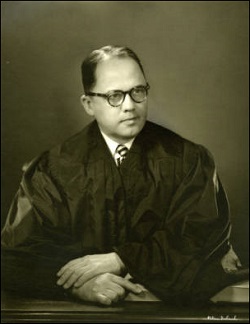Justice Bastow also sat on the bench of the 4th Department; more information can be found HERE.
Earle C. Bastow was born in Petersburg, New York, in 1898. He graduated from Albany Law School and was admitted to the Bar in 1921. Private practice followed with the law firm of Lee & Dowling in Utica, where he remained until his appointment as an Assistant District Attorney in 1932. He was elected District Attorney of Oneida County in 1942.
Bastow was elected a Supreme Court Justice for the 5th Judicial District in 1947 and was appointed to the Appellate Division First Department by Governor Dewey in 1953. Four years later Governor Harriman designated Justice Bastow to the Appellate Division Fourth Department, though he continued to assist the First Department by sitting in that court when the Fourth Department was out of session.
In 1968, Justice Bastow was appointed Presiding Justice of the Fourth Department, but relinquished that position at the end of that year, having reached the mandatory retirement age of 70. He was certified at that time as a retired Supreme Court Justice and redesignated for a two-year term to the Fourth Department. He retired from the bench at the end of 1970.
Early on, as a Supreme Court Justice, Bastow was named by Governor Dewey to preside over an extraordinary term of Supreme Court to investigate official corruption in the city of Ogdensburg. After the first year, the first trial resulting from that investigation took place, and a former Ogdensburg police chief and a slot machine distributor were found guilty of conspiracy in a slot machine racket and sentenced to one year in jail and fined $500 each.
While at the Appellate Division First Department, Justice Bastow was critical in one of his written opinions of the “time-consuming procedures” adopted in some matrimonial trials. He stated that, though the issues in the case were comparatively simple, the trial — which took more than a year to complete — represented an “almost classic example” of unnecessary delay in matrimonial proceedings. The trial was recessed several times.
In 1973, Justice Bastow was appointed by Chief Judge Charles D. Breitel of the Court of Appeals to a committee of eight former judges and lawyers to recruit a new administrator for the state’s court system. In 1977, the Court of Appeals appointed Bastow amicus curiae in a case concerning New York City to represent the interest of thousands of owners of short-term notes that were frozen by a moratorium that was declared unconstitutional by that Court.
Justice Bastow passed away on May 26, 1986.
Sources
The Appellate Division of the Supreme Court, Fourth Judicial Department, 1896-1996, p. 5
Crime Inquiry Set in Upstate County, New York Times, September 29, 1951, p. 24.
Delays Criticized in Alimony Cases, New York Times, April 5, 1958, p. 17.

